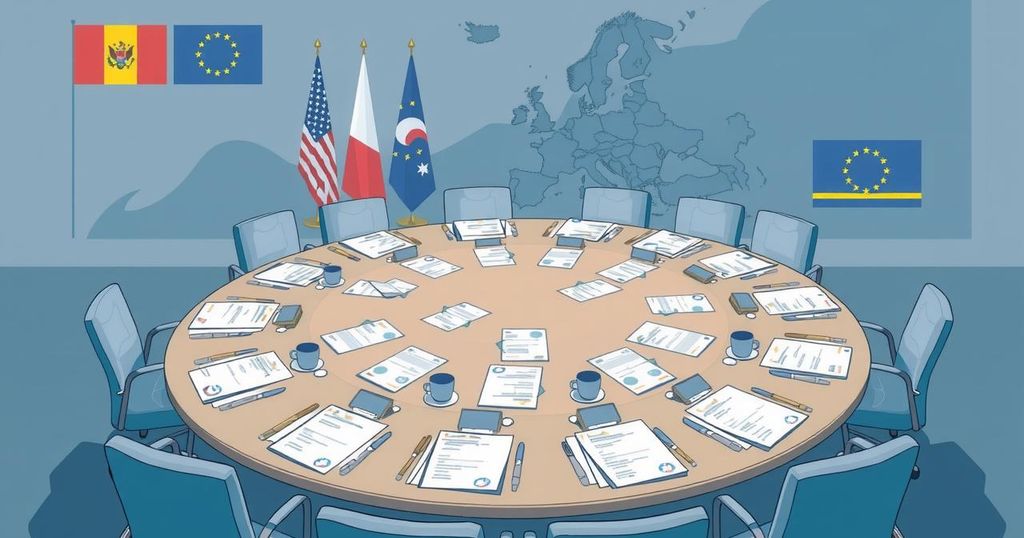The European Union leaders convened an emergency summit in Brussels to enhance security commitments regarding Ukraine after the U.S. suspended military aid. Key takeaways included a renewed focus on increasing defence budgets, firm support for Ukraine from European leaders, the proposal of a coalition to back peace efforts, and ongoing discussions regarding military supplies. Russia’s reaction emphasized its disapproval of NATO involvement as the EU leaders aim to unify efforts to bolster Ukraine’s defence capabilities.
Recently, European Union leaders convened in Brussels for an emergency summit to address heightened security concerns following the suspension of U.S. military aid to Ukraine. The meeting marked the first gathering of the 27 EU nations since a significant White House meeting between U.S. President Donald Trump and Ukrainian President Volodymyr Zelenskyy. With the U.S. decision to freeze military assistance, European leaders are increasingly focused on bolstering their own military support for Ukraine and ensuring national security.
A primary outcome of the summit was a renewed commitment from European leaders to increase defence budgets as the war in Ukraine persists. Leaders discussed strategies to enhance military capabilities while decreasing reliance on U.S. support, proposing measures such as fiscal flexibility and joint borrowing. European Commission President Ursula von der Leyen emphasized the importance of Europe being equipped to defend itself and support Ukraine effectively in achieving a lasting peace.
Zelenskyy continues to receive robust support from European leaders, who are exploring expanded military aid and potential security guarantees for Ukraine. He expressed gratitude for this backing, highlighting the solidarity among nations, while various leaders, including outgoing German Chancellor Olaf Scholz, emphasized the necessity of a just peace that respects Ukraine’s sovereignty.
Another significant topic was the formation of a “coalition of the willing” to support Ukraine in potential peace negotiations, proposed by U.K. Prime Minister Keir Starmer. Nations such as Canada, Denmark, and Ireland have shown interest in joining this coalition, with some considering the deployment of peacekeepers. Polish Prime Minister Donald Tusk asserted that Europe possesses the strength to overcome confrontations with Russia, provided it embraces this understanding.
During the summit, various military support updates were announced, including Belgium’s F-16 fighter jets due for delivery in 2026 and Sweden’s commitment of eight Gripen fighter jets for a NATO mission. An important proposal from French President Emmanuel Macron was the extension of France’s nuclear deterrence to other EU nations; however, it met mixed reactions from other leaders, with calls for enhanced defence spending being prioritized instead.
The Kremlin reacted to the summit by rejecting the possibility of European peacekeepers in Ukraine, viewing such moves as involving NATO directly in the conflict. Russian officials criticized Macron’s statements regarding Russia as a threat to Europe, calling them confrontational. Furthermore, Russian President Vladimir Putin asserted that any peace options must serve Russia’s long-term security needs.
As Europe solidifies its stance on supporting Ukraine, the urgent need for coherent funding strategies and clear strategic directions remain vital points of discussion among EU leaders. Moving forward, these discussions will necessitate concrete actions to ensure both Ukraine’s and Europe’s security.
In conclusion, the emergency summit highlighted European commitment to enhancing defence capabilities and supporting Ukraine amid evolving security dynamics. Key outcomes included an increase in defence spending, the exploration of military aid and security guarantees for Ukraine, and the proposal of a coalition to formalize support. While leaders remain united in their intent, challenges such as funding and strategic alignment continue to persist, underscoring the importance of decisive action in the coming months to bolster Europe’s security framework.
Original Source: www.aljazeera.com




